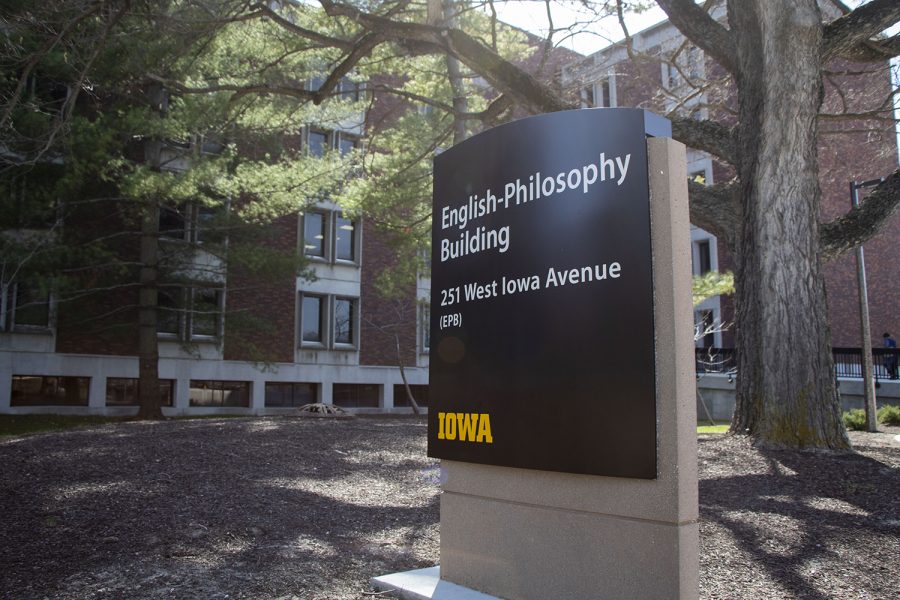New EPB window renovation leads to questions about COVID-19 transmission
After 55 years, the University of Iowa is renovating the English-Philosophy Building’s windows for the first time this summer. The windows, however, will be inoperable per university standards – leading to professor concerns about air flow.
The English-Philosophy Building at the University of Iowa is pictured on April 5, 2021.
April 6, 2021
By the end of the summer, the English-Philosophy Building at the University of Iowa will look slightly different. New, inoperable windows will be installed in the five-story building in summer 2021 and 2022.
Since the building’s construction in 1966, Assistant Director of Facilities Management Jeff Harney said its windows have never been updated.
“The windows are poor performing for both energy purposes and providing the right setup for energy savings,” he said. “They are prone to leaking…There are so many classrooms and 25,000 students go through the building in a week and putting these windows in will save the institution money in the long run.”
The construction was identified as an important project in fiscal year 2020 and was bid on in fall 2020, Harney said. During the bidding process, he said the university focused on what the best options would be in the long term, focusing on energy efficiency.
These windows will not be operable, Interim Director of Building Operations and Maintenance Julie Sychra said, which is the standard for UI buildings.
“It’s our standard to have inoperable windows because when we think about these large facilities that we take care of, they are different from a home environment,” she said. “Part of the operation of the air handling systems comes with testing and balancing and to ensure proper operation. Uncontrolled windows that open manually interferes with the testing and balancing.”
However, the air flow is a concern to professors in the wake of a pandemic-inducing virus that is mitigated by good airflow in an indoor space. Associate Professor of Philosophy Asha Bhandary said the current windows are somewhat openable and, with COVID-19, she was hoping there would be a chance for more fresh air in the building after window repairs.
“I was very surprised to hear that the university was sealing the windows because people in the EPB have concerns about the air in the building,” she said. “…Especially with COVID, people have a new awareness of the value of fresh air in buildings and that’s not possible with sealed windows.”
The importance of air quality has been a more important conversation as universities and school districts across the country continue to ensure low levels of transmission in classrooms, said Khaled Talaat, a Ph.D. candidate and research assistant at the University of New Mexico.
RELATED: EPB gets makeover
Talaat assisted in an October 2020 study focusing on the best way to decrease aerosol transport within classrooms. He said the simple act of opening windows in warmer months decreases the transmission of COVID-19 drastically – and no other action compares.
“If you have windows open and air conditioning on in classrooms, almost 70 percent of the particles leave the system one way or another,” he said. “If you close the windows, we see 40 percent less particles leaving the system. Closing windows leads to more particle accumulation in the room that deposit on surfaces and some are going to stay there for some time.”
While the spread of COVID-19 was a concern in the project, Sychra said the building has upgraded filters to reduce virus transmission. She said open windows could lead to problems in the winter that the university wants to mitigate. The UI in setting course for a return to be a mainly residential campus and return to in-person learning this fall, the UI has told campus it would only hold classes in rooms that meet CDC COVID-19 ventilation recommendations.
“With the winters we have in Iowa, we see many examples where operable windows are opened and occupants forget to close them, and we end up with frozen pipes and other damage,” she said. “The upgraded filters are helping to reduce the risk of virus transmission, which is better than having the interference of open windows.”
This February, Sychra said the Fieldhouse on the west side of campus saw problems stemming from left-open windows during cold temperatures.
Bhandary said she is thankful that the English-Philosophy Building is being invested in, but she believes there are better options that would improve the building more than inoperable windows.
Simple purchases of heat inflating blinds with openable windows would allow students and professors to benefit from fresh air, she said. It would also allow for energy efficiency, Bhandary said.
“If we renovate the windows with ones that open, we can have the benefits of fresh air which would improve working and learning conditions for everyone who uses the building,” she said. “For this investment, in this landmark building, investing in a different design of windows would be a better choice.”



